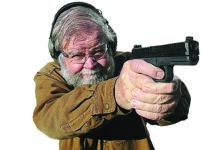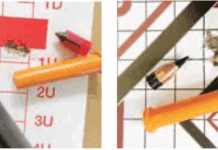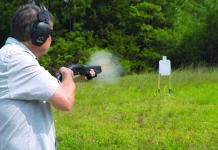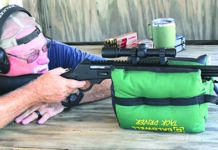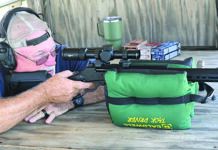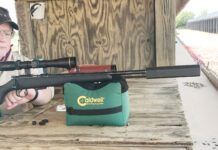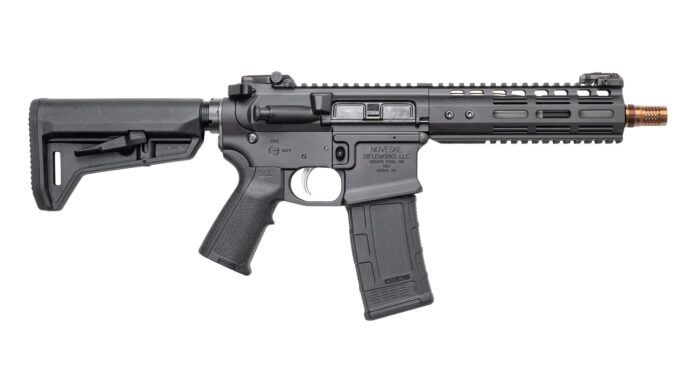
Several gun owners-rights groups and individual gun owners have sued the Bureau of Alcohol, Tobacco, Firearms, and Explosives seeking to have elements of the National Firearms Act of 1934 (NFA) declared unconstitutional because some of the regulated firearm and accessories are no longer taxed.
The case, Brown v. ATF, was filed in the U.S. District Court for the Eastern District of Missouri on August 1.
“The National Firearms Act isn’t just unconstitutional, it’s a tyrannical abomination,” said Firearms Policy Coalition (FPC) President Brandon Combs. “Not only does the NFA violate your Second Amendment rights, but Congress never had the lawful authority to pass it in the first place. That makes it a double abuse of power, violating both the right to keep and bear arms and the hard limits the Constitution places on the federal government.”
In addition to the FPC, the pro-gunowners-rights plaintiffs are Second Amendment Foundation (SAF), American Suppressor Association (ASA), National Rifle Association (NRA), Prime Protection STL Tactical Boutique, and two individual members of the organizations.
Plaintiff Chris Brown, whose name appears in the suit title, is a resident of St. Louis, Missouri. Brown is a firearms owner, a member of his local Friends of the NRA Board, the former Shooting Sports Chairman for the Greater St. Louis Area Council of the Boy Scouts of America (2017–2025), and a supporter of the Second Amendment right to keep and bear arms.
Plaintiff Allen Mayville is a resident of Omaha, Nebraska. According to the court filing, the “Individual Plaintiffs” Brown and Mayville value their personal privacy and do not want the federal government to obtain identifying information about their personally owned firearms. The NFA requirements are much more intrusive than regular firearms documents, and include their names, home addresses, photographs, dates of birth, demographic information, fingerprints, and a detailed description of their firearms, including their quantity and physical locations.
In 1937, the Supreme Court ruled that the NFA was primarily a revenue-generating measure, and the registration requirements of the statute served to verify who had paid the required tax. With the tax rate of $0 as part of the One Big Beautiful Bill, the constitutionality of requiring owners of suppressors, short-barreled rifles, short-barreled shotguns, and NFA-defined “any other weapons” to register with the federal government is no longer valid, the suit claims.
Until President Trump signed the One Big Beautiful Bill Act (OBBB), the NFA established a $200 tax and tax-enforcement registration regime on certain classes of firearms. With the elimination of this excise tax in the OBBB, the joint complaint alleges that the NFA registration regime is no longer justifiable as an exercise of Congress’s taxing power, nor any other Article I power.
The lawsuit also asserts that the NFA’s registration regime for suppressors and short-barreled rifles violates the Second Amendment. The Supreme Court has established that any regulation on arms-bearing conduct must be consistent with our nation’s historical tradition of firearm regulation. The complaint argues that there is no tradition that supports the NFA’s registration regime for protected arms such as suppressors and short-barreled rifles.
“The National Firearms Act’s registration scheme only exists to ensure that the tax on NFA firearms was paid,” said Adam Kraut, SAF’s executive director. “With Congress removing the tax on silencers, short-barreled firearms, and ‘any other weapons,’ the continued inclusion of these items in the NFA serves no purpose, except continuing to retain an impermissible hurdle to the exercise of one’s constitutional right to keep and bear arms. We look forward to relegating this unconstitutional law to the history books.”
“The National Firearms Act has been a weight around the neck of law-abiding gun owners for nearly a century,” said Knox Williams, president and executive director American Suppressor Association. “With the elimination of the excise tax on suppressors, short-barreled rifles, short-barreled shotguns, and AOWs through the One Big Beautiful Bill, our lawsuit challenges the NFA as an unconstitutional registry of now untaxed firearms. Common sense and the law are on our side, and we look forward to fighting on behalf of all Americans in federal court.”
“The National Firearms Act has infringed on law-abiding Americans’ right to keep and bear arms for nearly a century,” said John Commerford, Executive Director of the NRA Institute for Legislative Action. “Congress took a major step by eliminating the NFA tax on suppressors and short-barreled firearms through the OBBB, and we’re proud to work alongside other leading Second Amendment organizations to finish the job.”
Click here to read the lawsuit.
Click here to read our earlier coverage of the story.






